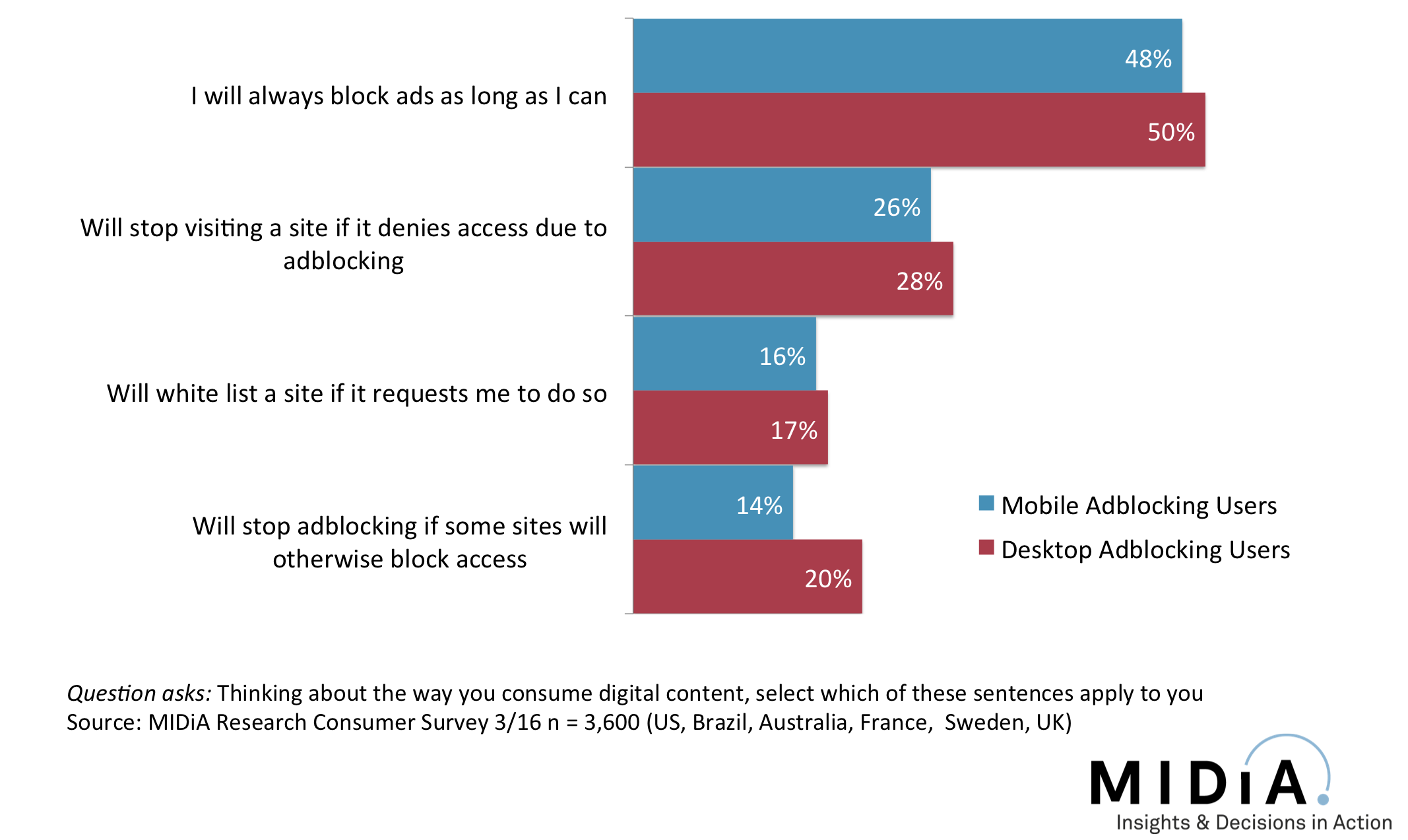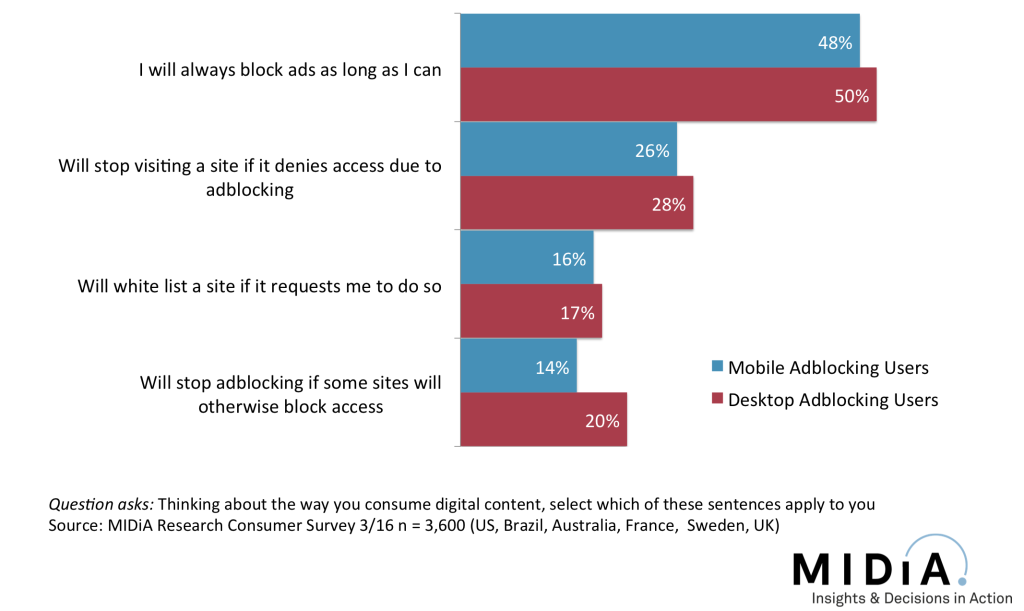Publishers Are Finally Uniting Against Adblocking Users, But It Won’t Solve The Adblocking Problem


As I highlighted in a blogpost in October 2015 – uniting fragmented defence tactics against the already united adblocking consumers is a critical move to mitigate publishers revenue losses.
Now half a year later we are seeing first signs of such initiatives in Sweden and France. Though patterns are starting to emerge around which defence tactics turn most adblocking users to whitelist a site, make no mistake – this will not solve the adblocking problem. It will buy publishers time as they try to find their grip on their fast receding negotiating power at the digital advertising table. While publishers may be able to slow adblocking growth, most adblocking users will not be turned by current tactics – except for a handful of the most popular sites.
Adblocker Users Show Little Interest In Publisher’s Efforts To Tackle Adblocking
Adblocking Consumers’ Attitudes Towards Publishers’ Strategies, By Adblocker Type
 For the 14% and 20% of mobile and desktop adblocker users who would switch off adblocking if a site blocks their access, there are also 26% and 28% of mobile and desktop adblocker users that would instead stop visiting the site. For adblocker user bans to be effective, there needs to be a critical mass of popular ad-supported sites acting in an orchestrated manner, essentially leaving consumers with few options. Two countries is a good start. But given the consumers’ ease of access to digital media outlets around the world, publishers in many more countries must come on board if this is to work on a global scale. While orchestrating such initiatives understandably requires time, publishers haven’t got all that much of it to spare. The main reason current adblocking penetration still shies away from hitting mainstream is that most consumers are not yet aware it exists. Currently 80% of users who are aware of adblocking block ads on desktop and 46% on mobile. In other words, adblocking is here to stay. Despite the ‘early days’’ hostile atmosphere between publishers and adblockers, their long-term future is one of coexistence and perhaps partnership.
For the 14% and 20% of mobile and desktop adblocker users who would switch off adblocking if a site blocks their access, there are also 26% and 28% of mobile and desktop adblocker users that would instead stop visiting the site. For adblocker user bans to be effective, there needs to be a critical mass of popular ad-supported sites acting in an orchestrated manner, essentially leaving consumers with few options. Two countries is a good start. But given the consumers’ ease of access to digital media outlets around the world, publishers in many more countries must come on board if this is to work on a global scale. While orchestrating such initiatives understandably requires time, publishers haven’t got all that much of it to spare. The main reason current adblocking penetration still shies away from hitting mainstream is that most consumers are not yet aware it exists. Currently 80% of users who are aware of adblocking block ads on desktop and 46% on mobile. In other words, adblocking is here to stay. Despite the ‘early days’’ hostile atmosphere between publishers and adblockers, their long-term future is one of coexistence and perhaps partnership.
Featured Report
The AI entertainment revolution How artificial intelligence will reshape media consumption
2023 has been jump-started by rapid progression in the adoption of artificial intelligence (AI). From the launch of ChatGPT to AI-powered DJs, this technology is revolutionising common practices, impacting...
Find out more…304 million cumulative monthly active adblocker users now leave publishers with a lot of work to do. Specifically, they have to carefully juggle two major and separate challenges:
Reinventing the consumer appeal of digital adsPatching up the immediate revenue leakageIn designing solutions, publishers:
Must become closely familiar with behaviours of adblocker users, and the attitudes which drive themMust NOT underestimate the threat of mobile adblocking simply because it’s larger on desktop now.Must Stay up to date with fast developing business models, technologies and aspirations of key adblocker players as well as their commercial progress.Must strictly evaluate and extend the value that digital ads currently provide to consumersTo help navigate these challenges, we combined findings from our March 2016 survey with 3600 consumers in 6 key markets, interviews with key adblockers, and analysis of public and proprietary data. The analysis is available across two MIDiA Research reports and among other findings includes:
Decoding The Mobile Adblocking Threat MAU of key adblockersDrivers, hurdles and the potential of mobile adblockingKey mobile adblocking player profilesSWOT analysis of key mobile adblocking solutions (extensions, browsers and network level adblocking)Timeline of key recent mobile adblocking developmentsDecoding The Mobile Adblocking ConsumerAdblocking Penetration (Desktop vs. Mobile)Whitelisting behaviour of consumers (Desktop vs. Mobile)Consumers’ reasons for blocking ads (Desktop vs. Mobile)Consumer attitudes towards specific defence tactics (Desktop vs. MobileWhy it might make commercial sense for publishers to join adblockers’ monetization initiativeBoth reports are immediately available to Subscribing MIDiA Clients. If you’d like to find out how to become one or enquire about these reports individually, please drop us a line at info@midiaresearch.com

The discussion around this post has not yet got started, be the first to add an opinion.